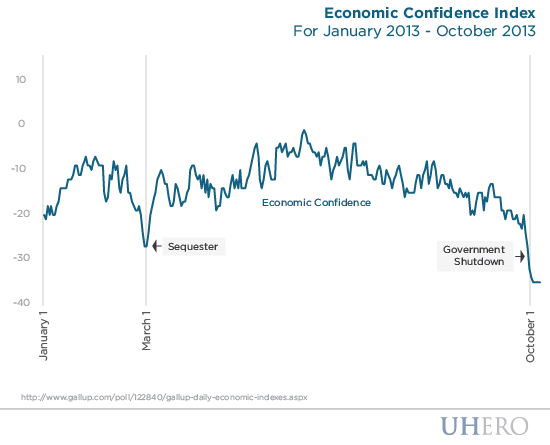By Peter Fuleky
There are about 34,000 civilian federal jobs in Hawaii, a fraction of which were deemed essential and have therefore not been furloughed. Many of the 18,000 Department of Defense employees were ordered back on the job after the first week of the shutdown, and they are expected to be paid on time. Moreover, the House unanimously passed legislation to guarantee retroactive pay for all furloughed federal employees when the shutdown ends. But the effect of the shutdown goes beyond some delayed paychecks. Among others, it cuts into the income of many government contractors, hampers the investigation of the molasses spill in Honolulu Harbor, and leaves all seven national parks in the state closed, souring the mood of many visitors and ceasing the revenue stream to hundreds of tourism- dependent businesses.
In fact, consumer confidence has taken a nosedive since the first day of the shutdown, and if this decline persists, it may have a greater effect than lost/delayed income. In times of uncertainty people tend to cut back on discretionary spending such as leisure travel. Even if many would-be visitors end up eventually booking their trip to Hawaii, it may take a while before they do so. People also tend to put on hold the purchase of big ticket items and homes during uncertain times. The impact of the shutdown gets magnified as the reluctance to spend filters through the economy. Obviously, the longer the impasse lasts the greater its effects. Unfortunately, given the appetite of this Congress to create artificial crises, we may have to wait for calmer times at least until the next elections.

BLOG POSTS ARE PRELIMINARY MATERIALS CIRCULATED TO STIMULATE DISCUSSION AND CRITICAL COMMENT. THE VIEWS EXPRESSED ARE THOSE OF THE INDIVIDUAL AUTHORS. WHILE BLOG POSTS BENEFIT FROM ACTIVE UHERO DISCUSSION, THEY HAVE NOT UNDERGONE FORMAL ACADEMIC PEER REVIEW.